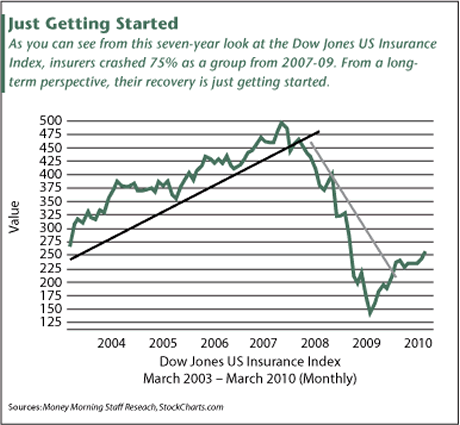Three Ways to Profit From an Insurance-Sector Rebound
Companies / Sector Analysis Apr 01, 2010 - 05:50 AM GMTBy: Money_Morning
 Jon D. Markman writes:
Regional banks, investment bankers and insurance companies will be key winners in the next phase of an advance that will be characterized by very lukewarm participation by the average private investor.
Jon D. Markman writes:
Regional banks, investment bankers and insurance companies will be key winners in the next phase of an advance that will be characterized by very lukewarm participation by the average private investor.
Most investors will be surprised by this turnabout - and especially by the insurance-sector rebound.
Let me show you three ways to profit.
 Handicapping the Credit Market Rebound
Handicapping the Credit Market Rebound
Brian F. Reynolds, chief market strategist for WJB Capital Group Inc. - and easily the best independent credit analyst around - observes that the longer the credit bull market continues without enthusiastic participation from equity investors, the more companies will engage in shareholder-friendly transactions on their own.
That means buybacks, dividend increases and mergers and acquisitions (M&A). These are all things that company executives can do to boost share prices themselves without requiring the help of equity buyers.
Financial companies are the major beneficiaries of this type of action - in part because they get paid to underwrite and organize them. For this reason, financial-company stocks should be the biggest beneficiary of this next phase because they were the most heavily targeted by bear raids that occurred at the 1,200 level on the Standard & Poor's 500 Index.
The Big Bang (From Bonds) Theory
Insurers are a special case in this scenario because they are the largest holders of corporate debt - $2.2 trillion worth, to be exact. And they were buying it at the fastest pace in five years in 2009, taking advantage of a market that was, in the words of investing iconWarren Buffet, "raining gold."
Bloomberg News has reported that insurers' net purchases of corporate bonds hit $153 billion in 2009, with the largest portion purchased in the first quarter when yields were at their highs for the year.
In 2008, by comparison, there was a net outflow from bonds of $59 billion.
These purchases have turned out to be the steal of the century, helping big insurers likeMetLife Inc. (NYSE: MET) and PrudentialFinancial Inc. (NYSE: PRU) recover much of the capital they lost in the slumps of January 2008-February 2009 from misplaced bets on real estate and stocks.
U.S. Federal Reserve data shows that life insurers bought eight times more bonds than property-casualty (P/C) insurers in 2009. Buffett - the most visible exec in the P/C insurance world because of his role at Berkshire Hathaway Inc. (NYSE: BRK.A, BRK.B) - said in his annual letter to shareholders that corporate bonds were "ridiculously cheap" in early 2009 and he regretted not buying more.
''Big opportunities come infrequently,'' he wrote. ''When it's raining gold, reach for a bucket, not a thimble.''
Corporate debt provided a total return of 26% last year after losing 11% in 2008, market data shows. And it's still considered pretty cheap compared to past levels. Bloomberg reports that credit analysts at Barclay's PLC (NYSE ADR: BCS) expect life insurers to buy another $100 billion in corporate debt over the next year and a half. And that is backed up by statements made by execs with The Allstate Corp. (NYSE: ALL) and Met in several recent earnings conference calls.
Why Insurers Are Poised For Profit
The bottom line is that insurance companies profit by investing their customers' premiums in long-dated assets - such as credit and real estate - and earning dividend payments at rates higher than the total amount they need to pay out to cover expenses and to settle claims.
The cheaper they buy the credit, the more it yields and the more they profit. They are now enjoying a virtuous cycle of gains - a cycle that should take hold. The reason: the risks that they took last year ought to pay off for years to come.
This is why I think insurers will generate better-than-average performance over the next few years - as long as inflation remains at bay, since an escalation in price levels would eat away at the gains from the bonds.
My main recommended play on this is the SPDR KBW InsuranceFund (NYSE: KIE), an exchange-traded fund (ETF), and I would recommend adding to it when it flat-lines or dips in the coming years.
Many of the smaller insurance companies, such as The Progressive Corp. (NYSE: PGR), and reinsurers, such as XL Capital Ltd. (NYSE: XL), will also likely perform well.
Source: http://moneymorning.com/2010/04/01/insurance-sector-rebound/
Money Morning/The Money Map Report
©2010 Monument Street Publishing. All Rights Reserved. Protected by copyright laws of the United States and international treaties. Any reproduction, copying, or redistribution (electronic or otherwise, including on the world wide web), of content from this website, in whole or in part, is strictly prohibited without the express written permission of Monument Street Publishing. 105 West Monument Street, Baltimore MD 21201, Email: customerservice@moneymorning.com
Disclaimer: Nothing published by Money Morning should be considered personalized investment advice. Although our employees may answer your general customer service questions, they are not licensed under securities laws to address your particular investment situation. No communication by our employees to you should be deemed as personalized investent advice. We expressly forbid our writers from having a financial interest in any security recommended to our readers. All of our employees and agents must wait 24 hours after on-line publication, or 72 hours after the mailing of printed-only publication prior to following an initial recommendation. Any investments recommended by Money Morning should be made only after consulting with your investment advisor and only after reviewing the prospectus or financial statements of the company.
Money Morning Archive |
© 2005-2022 http://www.MarketOracle.co.uk - The Market Oracle is a FREE Daily Financial Markets Analysis & Forecasting online publication.



